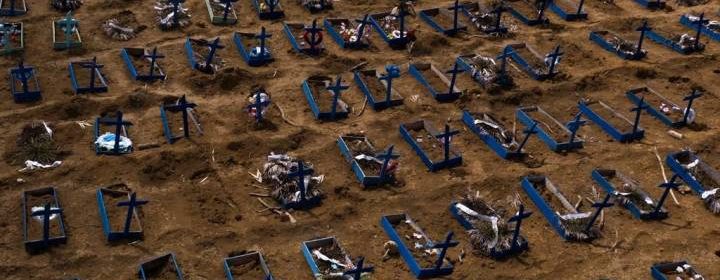Coronavirus engulfs Latin America as Brazil, Mexico report record surges in cases

Brazil and Mexico on Thursday reported a record one-day rise in new coronavirus cases, just as leaders of both countries intensified attempts to reopen their economies even as the spread of the virus in Latin America is seemingly gathering pace.
Brazilian right-wing populist President Jair Bolsonaro and Mexico’s leftist leader Andres Manuel Lopez Obrador have frequently swum against the tide of scientific opinion since the crisis broke out, first by playing down the threat of the virus and more recently by focusing on reopening their economies despite rising cases.
The surge in virus cases across chunks of Latin America comes at a time when other regions, especially Europe and China, are seeing a downward trajectory of new infections.
Brazil, the hardest-hit country in Latin America, registered a daily record of 13,944 new cases, bringing its total to 202,918 confirmed cases of the virus and 13,933 deaths since the outbreak began, according to health ministry data.
Mexico, the second most impacted nation in the region, reported 2,409 new infections on Thursday, to bring its total confirmed coronavirus cases to 42,595. An additional 257 coronavirus deaths brought total fatalities to 4,477.
“We are in the most difficult moment of the first wave of the epidemic,” Mexico’s coronavirus tsar, Hugo Lopez-Gatell, said on Thursday.
He said Mexico was at the peak of its pandemic cycle and “could not relax measures,” warning that the country needed to embrace a “new normality” amid threats of virus resurgence. On Thursday, government data showed more than half of hospitals in the capital were saturated with coronavirus patients.
[ Sign up for our Health IQ newsletter for the latest coronavirus updates ]
Lopez-Gatell’s comments jarred with intensifying preparations to ease restrictions and reopen Mexico’s economy, especially the automotive sector and factories near the U.S. border to help supply chains vital for U.S. manufacturing companies.
Similar efforts to fire up the economy were gathering pace in Brazil, as Bolsonaro urged business leaders to push for lifting lockdown orders in Sao Paulo, the financial center.
In a videoconference, Bolsonaro told a gathering of business leaders to “play tough” with Sao Paulo Governor Joao Doria, who has issued social distancing orders and said he will not comply with Bolsonaro’s latest decree to reopen gyms and beauty salons.
Colombia stepped up measures Thursday night aimed at halting coronavirus infections near its border with Brazil as its own hospitals grow overwhelmed and cases rise in a vulnerable part of the Amazon home to many indigenous groups.
President Ivan Duque announced that all residents in the Amazonas department are being ordered to stay inside except to seek food or medical attention. The military has also dispatched troops to strengthen border security.
“We find ourselves in a situation that could turn critical given the differences we have from an epidemiological viewpoint with neighbours,” Duque said.
Colombia has taken some of the region’s strictest measures against the virus, implementing an early nationwide lockdown that remains in effect in much of the country.
Colombia’s river port city of Leticia and the giant Amazonas department have seen a spike in cases in recent days, swelling from 105 at the start of the month to 924. Doctors say the region’s poorly equipped hospitals are crowded, and local officials say they may need to open a new cemetery to handle the number of bodies.
Thus far, 30 people have died in the department.
Many indigenous people live near Leticia, making them particularly vulnerable to catching the virus. A total of 146 have been diagnosed, according to the National Indigenous Organization of Colombia. Six people have died, according to the group.
In Nicaragua, where leftist President Daniel Ortega has faced criticism for not enacting any lockdown measures, the United States on Thursday told American citizens there and their “families to shelter in place.”
“U.S. citizens remaining in Nicaragua must ensure they have an adequate supply of food, water, and medicine to shelter for at least two weeks,” the embassy said in a statement.
Nicaragua has 25 reported cases, but doctors in swamped hospitals have told Reuters the number of cases is significantly higher.
(Reporting by Drazen Jorgic in Mexico City, Pedro Fonseca in Rio de Janeiro and Lisandra Paraguassu in Brasilia; Additional reporting by Ismael Lopez in Nicaragua. Writing by Drazen Jorgic; Editing by Leslie Adler)
—With files from the Associated Press in Colombia
Source: Read Full Article

